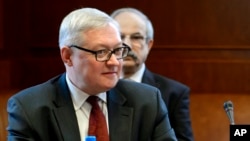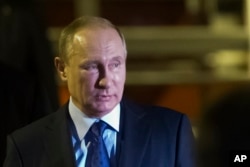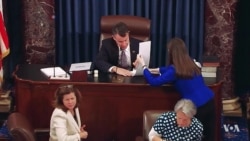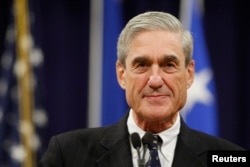Russian President Vladimir Putin is ordering the United States to cut its diplomatic staff in Russia by 755 people in response for new U.S. sanctions imposed over Russian meddling in the 2016 presidential election.
Putin told a Russian television network that his government could take more retaliatory steps against the U.S., but that he is “against it as of today.”
The U.S. State Department called Putin's order “a regrettable and uncalled for act” and says it is assessing how to respond.
The U.S. Congress approved the new sanctions last Thursday in a package that also included new measures against Iran and North Korea. On Friday, Russia's Foreign Ministry made the first announcement of the counter measures, saying the sanctions confirm the “extreme aggression” of the U.S. in international affairs.
Long, long overdue
The ministry proposed reducing the U.S. diplomatic and technical staff in Russia to the same level as equivalent Russian staff in the United States. It said the cut, to 455 people, would need to be completed by the end of August.
“I think this retaliation is long, long overdue,” Russian Deputy Foreign Minister Sergei Ryabkov said Sunday in an interview with ABC News' This Week.
He said Russia has a “very rich toolbox” at its disposal in terms of other possible moves.
“It would be ridiculous on my part to start speculating on what may or may not happen," Ryabkov said. "But I can assure you that different options are on the table and consideration is being given to all sorts of things."
The Russian diplomat also said he believes there are areas where the two countries can and should work together, including nonproliferation of weapons of mass destruction, counterterrorism, human trafficking, illegal immigration and climate change.
"We are ready, we are stretching our hand forward, we are hopeful that someone on the other side, President Trump included, but also others may see here a chance for a somewhat different way," Ryabkov said.
WATCH: Trump Expected to Sign New Russia Sanctions
Sanctions await signature
U.S. President Donald Trump has not yet signed the sanctions legislation, but the White House says he will.
As Congress negotiated the bill for weeks, Trump aides objected because of a provision that gives lawmakers 30 days to review and block any effort by the president to ease sanctions against Russia. That includes President Barack Obama's decision to close two Russian compounds and expel 35 diplomats because of Russia's interference in the election.
Political analysts in the United States had thought Trump, in an attempt to ease tensions with Putin, might overturn the Obama sanctions when he assumed power in January, but he did not.
Russian meddling
Since then, the early months of Trump's presidency have been consumed by numerous investigations of Russian meddling in the election, including whether Trump aides colluded with Moscow to help him win. The probes are also looking at whether Trump obstructed justice by firing FBI Director James Comey who was leading the agency's Russia investigation.
Another former FBI director, Robert Mueller, was named to take over the criminal investigation.
Moscow has rejected the conclusion of the U.S. intelligence community that Putin personally directed Moscow's interference in the election. Trump has dismissed the investigations as a “witch hunt” and an excuse by Democrats to explain his upset win over Hillary Clinton.









